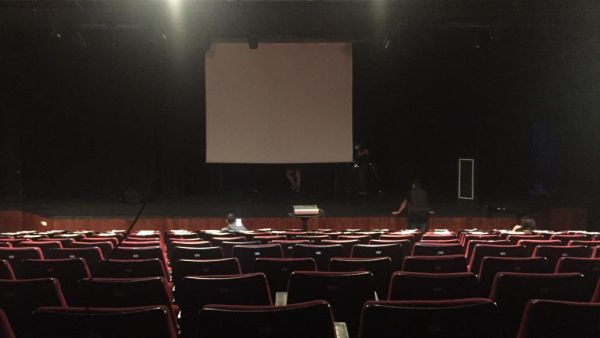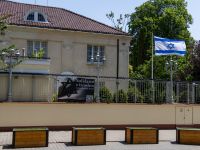Relationships and emotions are infamous for being difficult, layered like onions, downright puzzling, making great fuel for romantic dramas across media.
Bob Moukarzel’s “Rouh Rouhy,” staged at Theatre Monnot, picks apart some of those layers, through the rocky on/off relationship of a Beirut couple. Written and performed in Arabic, the play centers on Patricia Nammour, a stage actress, and Elie Mitri, a pianist, (who play themselves) post-breakup. It’s been a year since the couple parted ways.
The play begins with Elie waking at 3 a.m. to a knock on the door, only to find Patricia standing in the hallway an awkward and unexpected occurrence for both, it seems.
Having celebrated the opening of her new play, Patricia found herself walking and unconsciously, she claims, made her way to Elie’s door. Unsure, he invites her in for a drink.
Patricia’s fiery, passionate, often illogical personality clashes with and compliments Elie’s steady and thoughtful persona. The pair exchange small talk and a few barbs before getting down to the real reason she stopped by.
“Why did we break up?”
They flip between serious arguments and not-so-subtle subject changes like Patricia saying that normally Elie would contact her after their frequent breakups, and she didn’t think this time would be any different when she left him a year ago.
She asks if he’s seeing anyone and how his music career is doing.
Both are dating. Patricia hides this until boyfriend Marcel calls, wondering where she is, and Elie is confused why she’s acting so hurt and unable to move on, when clearly she has found a new lover.
Their chit-chat explores the idea of eternal love and what kind of love is real or fake. Should love be all-consuming and in-the-moment? Should it be steady and stable? Can a broken heart destroy a person or is that just a dramatized overreaction made popular by theater and movies?
Patricia believes eclipsing yet tragic love, like Romeo and Juliet’s, is the ultimate aspiration. Elie thinks they both died and no one got a happy ending. She wants unrestrained love. He has commitment issues.
The play is peppered with Elie’s musical numbers, played on piano, and contemporary dance scenes trying to convey various emotions. The dancing sometimes seems out of place with the play’s otherwise traditional theatrical approach the actors sometimes carry on regular conversations while Elie lifts Patricia and turns slowly as she flails her arms.
A moment later he puts her down and everything carries on normally, leaving some audience members wondering why it was necessary to inject this oddity into the play in the first place.
Following a few more jokes and disagreements, Patricia decides she should leave. Things get emotional. The former lovers kiss. Patricia spends the night.
The second act takes place another year later. Patricia has married Marcel and they’ve just moved into a roomy apartment with a garden. To return the favor, Elie spontaneously shows up at her door, demanding answers as to why she left and ignored his messages a year ago.
Having decided he still loves her and believing she feels the same, he asks her to leave her husband and come with him on his American concert tour. She refuses, revealing she now has a 3-month-old girl.
Elie leaves, hopeful she will trust him again and change her mind, ending the play rather abruptly. Patricia’s voice sounds out of the darkness, reading a message she sent him after he left, explaining why she didn’t answer his messages a year ago and asking him an important question.
Though the ending seems sudden, almost like the third act the audience was expecting was not given, it is likely intentional, denying the closure audiences automatically seek for the end of a story.
Despite knowing how the play ends, the “missing” third act and explanation reflects the lack of closure often experienced after a breakup a story suddenly cut short without warning.
The dance scenes may be an odd addition but the humor and natural chemistry between the actors makes for a good mix of light-hearted comedy and serious exploration of relationships that is easily relatable.
“Rouh Rouhy” resumes at Theatre Monnot Feb. 7-10 at 8:30 p.m.
This article has been adapted from its original source.








